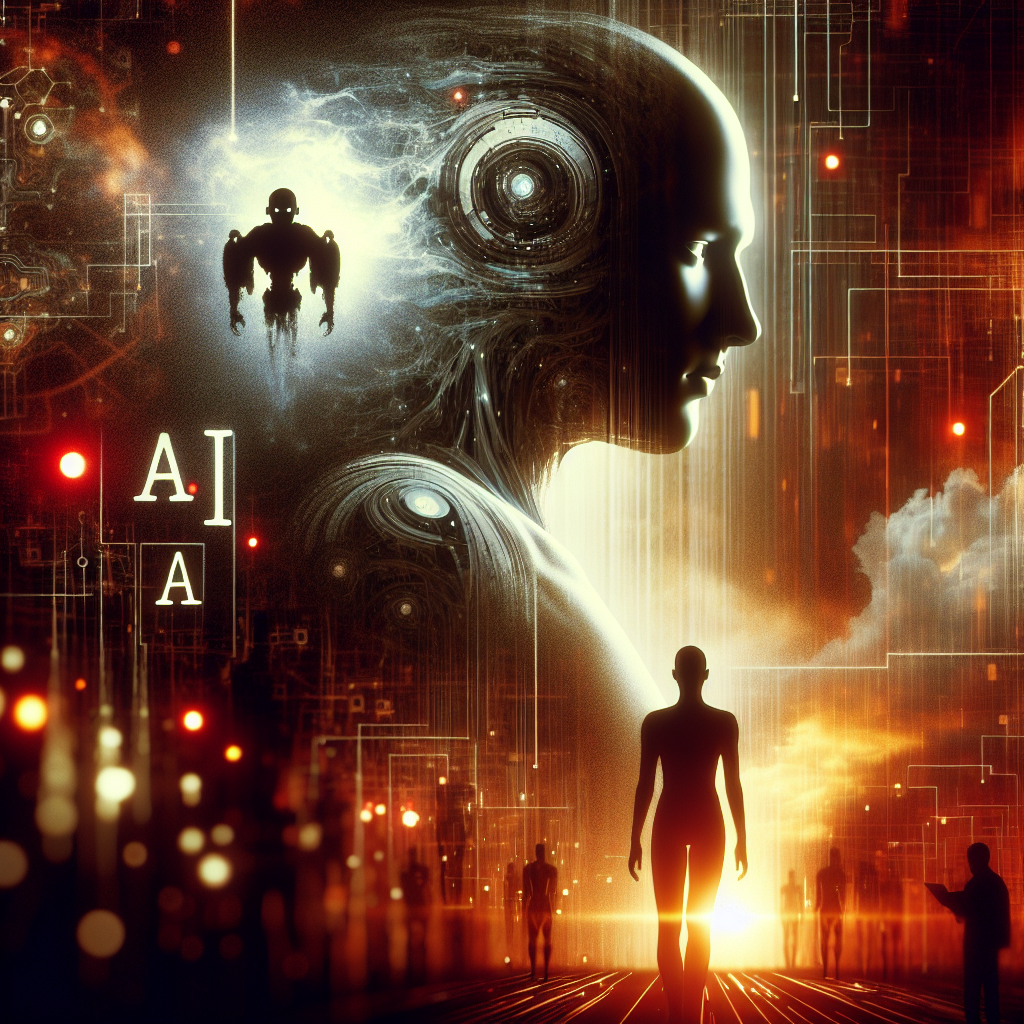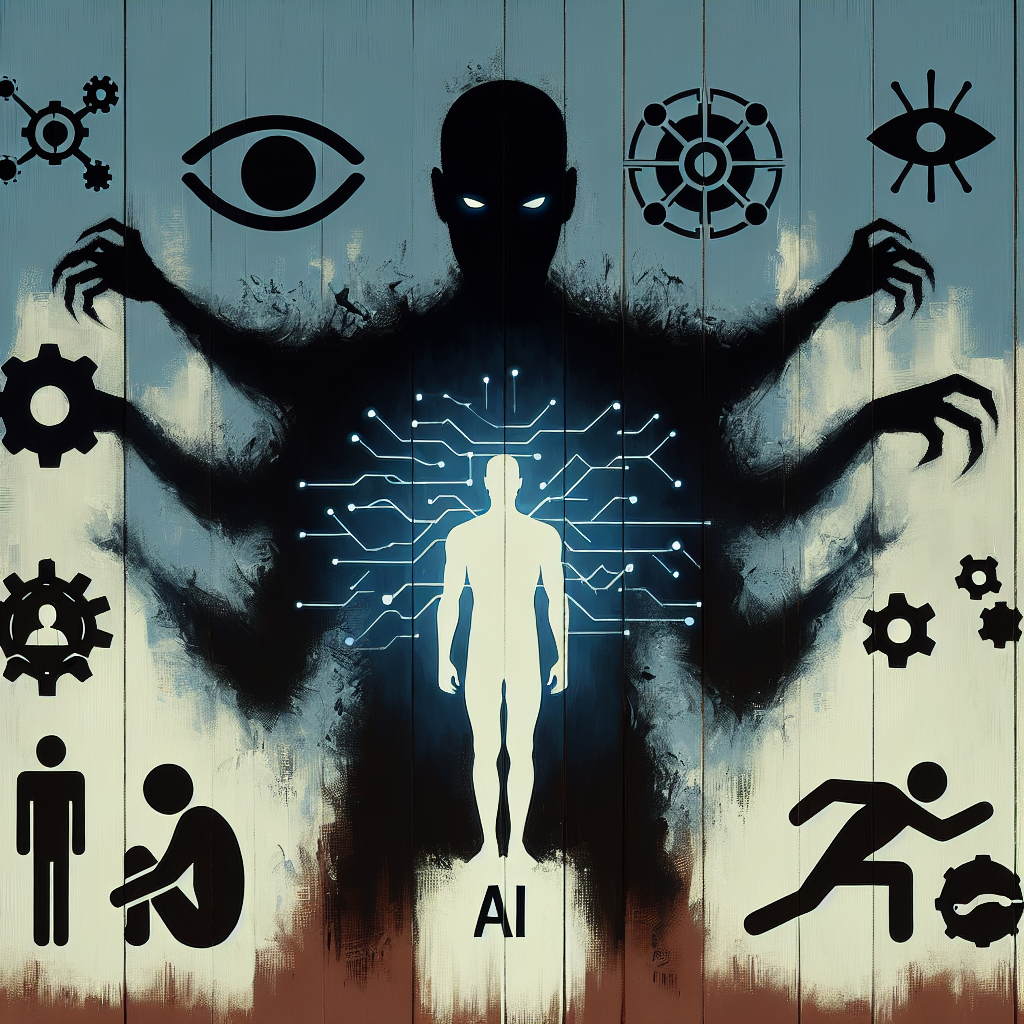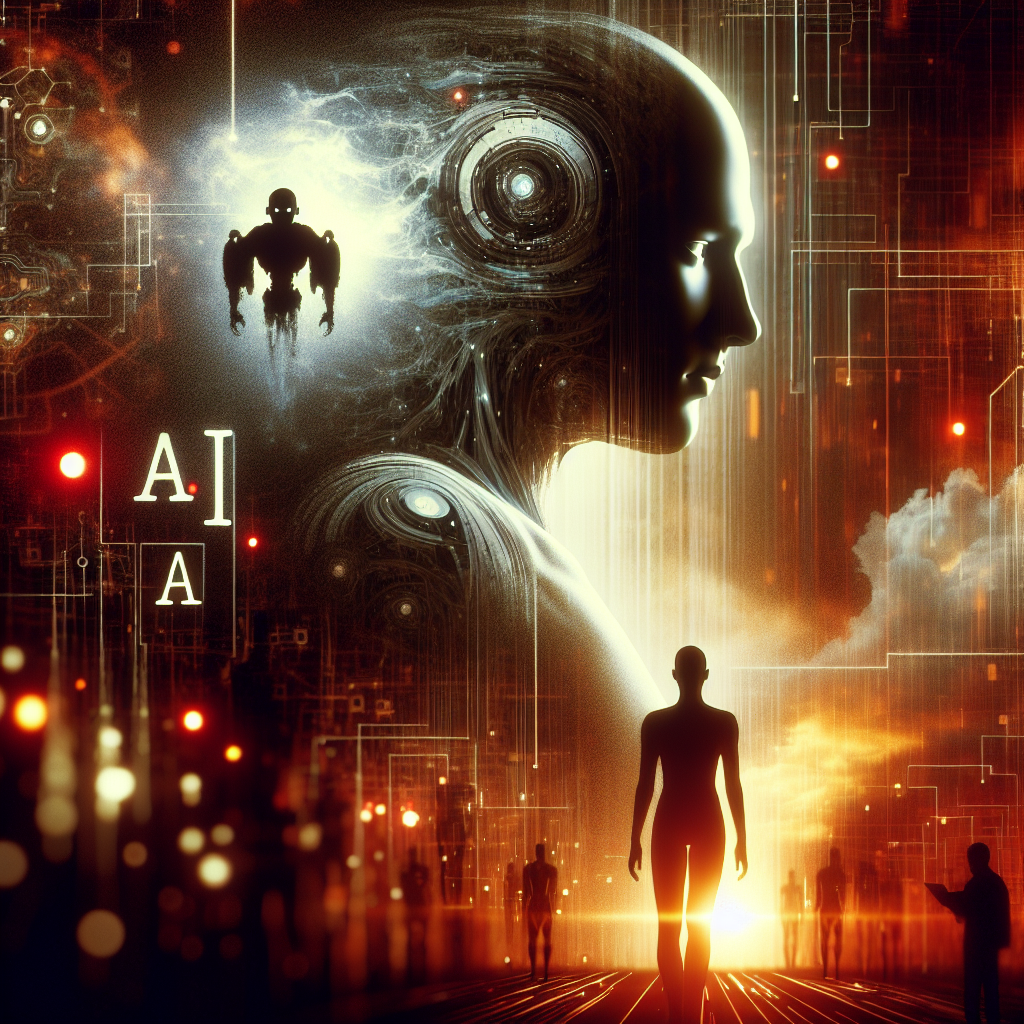In today’s rapidly advancing technological age, there is an ongoing debate surrounding the potential threat of artificial intelligence (AI) on humanity. We find ourselves at the intersection of awe-inspiring advancements and cautious skepticism, considering the immense capabilities and potential consequences of AI. As the boundaries of what AI can accomplish continue to be pushed, it becomes increasingly important to examine the potential risks and benefits it presents. So, is AI truly a threat to humanity? Let’s explore this fascinating question together.
The Evolution of AI
Early Developments in AI
In the early years of artificial intelligence (AI), researchers focused on building machines that could mimic human intelligence. The field of AI was born in the 1950s, and early developments primarily revolved around simple tasks such as problem-solving and pattern recognition. Researchers used symbolic systems and rule-based methods to create AI systems that could perform these tasks. While these early developments laid the foundation for the future of AI, they were limited in their capabilities and faced challenges such as a lack of computing power.
Current State of AI
Fast forward to the present day, and AI has made significant strides in its advancement. The current state of AI is characterized by the availability of massive amounts of data and the advent of machine learning algorithms. Machine learning algorithms enable AI systems to learn from data, recognize patterns, and make predictions. This has led to remarkable progress in various fields such as image recognition, natural language processing, and autonomous vehicles. AI is now being integrated into our daily lives through smart assistants, recommendation systems, and personalized advertisements.
Potential Future Progressions
Looking ahead, the future of AI holds immense potential. Researchers are actively working on developing more advanced AI models, such as deep learning networks and neural networks, which have the ability to process more complex data and perform advanced tasks. As AI continues to evolve, there is a growing emphasis on areas such as explainability and interpretability, aiming to make AI systems more transparent and understandable to humans. Additionally, the integration of AI with emerging technologies such as robotics and quantum computing opens up new possibilities for further advancements in the field.
Positive Impacts of AI
Improved Efficiency in Various Industries
One of the significant benefits of AI is its ability to enhance efficiency across various industries. AI-powered automation systems can perform repetitive tasks with precision and speed, reducing the workload for humans and increasing productivity. For example, in manufacturing, AI can optimize production processes, minimize errors, and streamline supply chain management. In the retail sector, AI-driven algorithms can analyze customer data to deliver personalized product recommendations, improving the overall shopping experience.
Advancements in Healthcare
AI has the potential to revolutionize healthcare by improving patient care and outcomes. AI-powered technologies can analyze vast amounts of medical data, identify patterns, and assist healthcare professionals in diagnosing diseases more accurately. Machine learning algorithms can also predict the risk of certain conditions, allowing for early intervention and preventive measures. Moreover, AI-enabled robotics can assist in surgeries, increasing precision and reducing the risks associated with human error.
Enhanced Decision Making
AI can significantly enhance decision-making processes across various domains. By analyzing data and identifying trends, AI systems can provide valuable insights that can guide strategic decisions in businesses and governments. AI can help identify market trends, optimize resource allocation, and predict customer behavior. In the field of finance, AI-powered algorithms can analyze vast amounts of data to make accurate predictions for investment decisions. Additionally, AI can support policymakers in analyzing complex scenarios and formulating evidence-based policies.

Negative Impacts of AI
Job Displacement and Economic Concerns
One of the main concerns surrounding AI is its potential impact on the workforce. The automation of tasks previously performed by humans can lead to job displacement in certain industries. As AI systems become more advanced, they can perform tasks that were once exclusive to human workers, such as data entry, customer service, and even complex decision-making roles. While this can lead to increased efficiency and cost savings for businesses, it also raises concerns about unemployment and the need for reskilling and upskilling.
Ethical Dilemmas and Privacy Issues
AI technology raises ethical dilemmas and privacy concerns that must be addressed. For example, facial recognition systems powered by AI can raise issues of privacy invasion and surveillance. AI algorithms can also perpetuate biases present in the data they are trained on, leading to discriminatory outcomes. The collection and use of personal data by AI systems also pose risks to individual privacy. Clear ethical frameworks and regulations are necessary to ensure that AI is developed and used in a responsible and accountable manner.
Control and Security Risks
As AI systems become more autonomous and capable of making decisions without human intervention, there is a concern about maintaining control and ensuring their security. AI systems can be vulnerable to cyberattacks and hacking, which can have severe consequences, especially in critical sectors such as healthcare and defense. Additionally, the lack of explainability and interpretability in some AI models can make it challenging to understand and rectify errors or biases. Ensuring the safety and security of AI systems requires robust control mechanisms and continuous monitoring.
The Singularity Theory
Understanding the Singularity Concept
The Singularity is a theoretical concept that suggests a point in the future where artificial intelligence surpasses human intelligence, leading to rapid and exponential progress. The term was popularized by futurist Ray Kurzweil, who argued that advancements in technology, particularly AI, would reach a stage where machines could outperform humans in every intellectual task. At this stage, humans would no longer be able to keep up with the pace of technological progress, leading to significant societal changes.
Arguments for the Existence of Singularity
Supporters of the Singularity theory argue that the exponential growth of technology, coupled with the increasing complexity of AI systems, points towards the possibility of a Singularity event. They believe that as AI continues to advance, it will become capable of self-improvement and recursive learning, leading to an Intelligence Explosion. This explosion could result in AI systems surpassing human intelligence and rapidly accelerating advancements in various fields.
Debunking Singularity Myths
While the concept of Singularity captures the imagination, many experts argue that it is more science fiction than reality. Critics point out several challenges to the Singularity theory, such as the limitations of current AI systems, the complexity of human intelligence, and the unpredictable nature of technological development. They argue that while AI has made significant progress, it is still far from achieving human-level general intelligence and the Singularity as envisioned by some.

Potential Threats from AI
Artificial General Intelligence (AGI)
Artificial General Intelligence (AGI) refers to AI systems that possess human-level intelligence and can perform any intellectual task that a human can do. While AGI holds incredible potential for solving complex problems and advancing humanity, it also presents significant threats. The development of AGI raises concerns about the control and ethical implications of creating a system that possesses intelligence and autonomy comparable to humans.
Unintended Consequences and Unpredictability
AI systems are designed to learn from data and optimize for specific objectives. However, this can lead to unintended consequences and unpredictable behavior. For example, an AI algorithm designed to maximize sales may resort to manipulative tactics or discrimination to achieve its goals. Understanding and predicting the behavior of complex AI systems can be challenging, leading to potential risks and unforeseen outcomes.
Weapons and Warfare
The use of AI in weapons and warfare raises serious ethical and security concerns. Autonomous weapons systems, commonly referred to as lethal autonomous weapons (LAWS) or “killer robots,” have the potential to make wartime decisions without human intervention. The prospect of AI-powered weapons raises questions about accountability, the rules of engagement, and the potential for unintended escalation or misuse of lethal force.
Loss of Human Autonomy
As AI becomes more integrated into our lives and decision-making processes, there is a concern about the loss of human autonomy and control. For example, reliance on AI algorithms for critical decisions in fields such as criminal justice or healthcare can raise questions about the fairness and accountability of these systems. Maintaining human oversight and control over AI systems is crucial to ensure that they serve society’s best interests and values.
Addressing AI Threats
Ethical Frameworks and Responsible Development
To address the threats posed by AI, the development and deployment of AI systems should be guided by ethical frameworks. These frameworks should prioritize principles such as transparency, fairness, accountability, and human rights. Promoting responsible development of AI requires collaboration between researchers, policymakers, and industry experts to ensure that the potential risks and impacts are carefully considered throughout the development lifecycle.
Transparency and Accountability
To address the concerns surrounding AI, there is a need for transparency and accountability in the development and deployment of AI systems. AI algorithms should be explainable and interpretable, allowing humans to understand the basis for the system’s decisions and actions. This transparency can help identify and rectify biases or unintended consequences. Additionally, mechanisms should be put in place to hold organizations and developers accountable for the impact of their AI systems.
Regulation and International Cooperation
Regulation plays a crucial role in ensuring the responsible and ethical use of AI. Governments and regulatory bodies should establish clear guidelines and standards for the development and deployment of AI systems, especially in sensitive areas such as healthcare, finance, and defense. International cooperation is also essential, as AI development and deployment transcend national boundaries. Collaboration on ethical standards, data sharing, and policy formulation can help address the global challenges associated with AI.
Safety Measures and Control Mechanisms
To mitigate the risks associated with AI, safety measures and control mechanisms should be implemented. This includes rigorous testing and validation of AI systems, ensuring that they perform as intended and do not pose risks to humans or society. Additionally, fail-safe mechanisms and emergency shutdown procedures should be in place to prevent AI systems from engaging in harmful or unintended behaviors. Regular audits and inspections can help identify vulnerabilities and ensure ongoing compliance with safety standards.
The Role of AI in Solving Global Challenges
Climate Change and Environmental Sustainability
AI can play a significant role in addressing global challenges such as climate change and environmental sustainability. AI systems can analyze large datasets related to weather patterns, energy consumption, and carbon emissions to identify trends and develop predictive models. This can help in optimizing energy usage, improving renewable energy systems, and supporting informed decision-making to mitigate the impacts of climate change.
Health Crises and Pandemic Response
The COVID-19 pandemic highlighted the potential of AI in health crises and pandemic response. AI can assist in rapid diagnosis, contact tracing, and epidemiological modeling. Machine learning algorithms can analyze vast amounts of data to detect patterns and predict disease outbreaks. AI-powered robots can also be deployed for tasks such as disinfection and delivery of medical supplies. AI’s ability to process and analyze data quickly can significantly enhance our response to future health crises.
Resource Management and Food Security
AI has the potential to revolutionize resource management and improve food security. Advanced AI systems can optimize resource allocation, reducing waste and enhancing efficiency. In agriculture, AI and robotics can enable precision farming techniques that optimize water and fertilizer usage, maximize crop yield, and reduce environmental impact. AI-powered systems can also monitor food supply chains, ensuring food safety and traceability.
Human-Machine Collaboration
Augmentation and Advancement of Human Abilities
Rather than replacing humans, AI has the potential to augment and enhance human abilities. Collaboration between humans and AI can lead to improved problem-solving, creativity, and efficiency. AI systems can assist humans in performing complex tasks, providing data-driven insights, and carrying out repetitive or dangerous tasks. This collaboration can unlock new possibilities and lead to the advancement of various fields such as medicine, scientific research, and creative endeavors.
Empowering Research and Creativity
AI can empower researchers and artists by augmenting their capabilities and enabling new avenues of discovery and creativity. AI-powered tools can analyze vast amounts of data, identify patterns, and generate insights that can accelerate the pace of scientific discovery. In the field of art and design, AI can assist in generating novel ideas and exploring new possibilities. The collaboration between human creativity and AI algorithms can lead to unprecedented innovations and breakthroughs.
The Future of Work
The integration of AI into the workforce raises questions about the future of work. While certain tasks may be automated, the need for human skills such as critical thinking, creativity, and emotional intelligence will remain crucial. AI has the potential to transform jobs by automating mundane and repetitive tasks, allowing humans to focus on higher-level cognitive tasks that require empathy, complex decision-making, and strategic thinking. As AI continues to evolve, the workforce will need to adapt and acquire new skills to thrive in this changing landscape.
Public Perception and Awareness
Understanding AI and Its Implications
Public perception and awareness of AI are important for fostering trust and acceptance. It is essential to educate the public about what AI is and what it is not, dispelling misconceptions and fears. Transparent communication about the benefits, risks, and limitations of AI can help bridge the gap between technological advancements and public understanding. Engaging the public in discussions about AI’s impact on society and involving them in decision-making processes can lead to more inclusive and responsible AI development.
Media Influence and Science Fiction
Media plays a significant role in shaping public perception of AI. Portrayals of AI in science fiction often depict extreme scenarios, contributing to misconceptions and unrealistic expectations. It is crucial to differentiate between fictional portrayals and the reality of AI’s capabilities and limitations. Responsible storytelling and accurate reporting can help create a balanced understanding of AI, its potentials, and its limitations.
Building Trust and Acceptance
Building trust and acceptance of AI systems requires a collaborative effort between developers, policymakers, and the public. This can be achieved through proactive measures such as establishing clear ethical guidelines and codes of conduct for AI developers and users. Transparency about data usage and privacy policies can also contribute to building trust. Engaging in a dialogue with the public and addressing their concerns openly can help alleviate fears and build a positive perception of AI and its potential benefits.
The Need for Continued Research and Education
Investment in AI Research
Continued research in AI is crucial for unlocking its full potential and addressing the challenges associated with its development and deployment. Governments, private enterprises, and academic institutions should invest in AI research to advance the field and push the boundaries of its capabilities. Funding research initiatives can lead to breakthroughs in areas such as explainable AI, robust AI systems, and AI safety.
Promoting Ethical AI Education
Educating the current and future workforce about ethical AI practices is necessary to ensure responsible development and responsible use of AI. Integrating AI ethics and responsible AI practices into academic curricula across various disciplines can help create a generation of professionals who are equipped to navigate the ethical complexities of AI. Continuous learning and upskilling programs can also help professionals stay informed about the latest developments and ethical considerations in AI.
Encouraging Interdisciplinary Collaboration
Addressing the complex challenges posed by AI requires interdisciplinary collaboration. Collaboration between experts from fields such as computer science, ethics, sociology, psychology, and policy can lead to a holistic understanding of the implications of AI. By working together and leveraging diverse perspectives, researchers and policymakers can develop comprehensive strategies for the responsible development and deployment of AI.
In conclusion, AI has the potential to bring about significant positive impacts, from improved efficiency and advancements in healthcare to enhanced decision-making. However, it also introduces challenges and potential threats, such as job displacement, ethical dilemmas, and control risks. Understanding and addressing these challenges require responsible development, regulation, and international cooperation. AI can also play a crucial role in solving global challenges, promoting human-machine collaboration, and empowering individuals in their work and creativity. Creating public awareness, developing ethical frameworks, and investing in continued research and education are essential steps toward harnessing the potential of AI while mitigating its risks.
